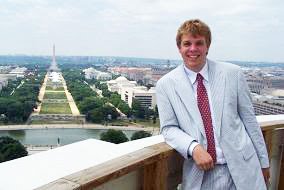 Despite major headwinds, the Democrats' Health Care/Insurance reform bill has made progress on Capitol Hill in the last couple of weeks as Max Baucus' Senate Finance Committee passed its version of the legislation out of committee. It is now one of five versions or reform circulating on the Hill, however, it is by far the most important and most likely to be the vehicle for ObamaCare. Baucus' bill, actually only "conceptual language" when released is the product of months of bipartisan negotiations between 3 Democrats and a dwindling group of moderate Republicans. In the end, Democrats were left with only one Republican aye vote in committee, Maine's Olympia Snowe, a very moderate and independent, thus exceedingly powerful, Senator.
Despite major headwinds, the Democrats' Health Care/Insurance reform bill has made progress on Capitol Hill in the last couple of weeks as Max Baucus' Senate Finance Committee passed its version of the legislation out of committee. It is now one of five versions or reform circulating on the Hill, however, it is by far the most important and most likely to be the vehicle for ObamaCare. Baucus' bill, actually only "conceptual language" when released is the product of months of bipartisan negotiations between 3 Democrats and a dwindling group of moderate Republicans. In the end, Democrats were left with only one Republican aye vote in committee, Maine's Olympia Snowe, a very moderate and independent, thus exceedingly powerful, Senator.The bill drew fire from both sides of the aisle. Republicans, despite some limited moderation, believe the bill still takes too much power from patients, giving it to government, and costs too much for individuals, families and the country, over $2 trillion by some analysis, sending soaring deficits higher. Liberals, meanwhile, don't believe the bill goes far enough in the direction of government run health care. Both sides regret that the bill falls far short of covering all Americans. There are many problems with this piece of "conceptual language," but the fact that it has been panned by both sides could be a signal that it is approaching some middle ground on the issue, often a positive position from which to launch major reform. I do not support the bill in its current form, but it is a substantive improvement from the more government, more spending, more taxes, more debt approach favored by Pelosi. Unfortunately, given that relative to the other 4 bills this is the moderate alternative, the final bill voted on in the Senate and the product out of the Conference Committee which will merge that bill with a more liberal House bill, will almost certainly be a greater afront to individual liberty and fiscal responsibility.

Public support of health care reform has dropped slightly with the committee passage of the bill. Only 42% of Americans support reform while 54% oppose according to Rasmussen. Even more, 56%, believe health care costs will go up if ObamaCare passes Congress, a rejection of one of Obama's primary justifications for reform. More broadly, Americans by a factor of 2 to 1 believe Government is doing too much, too fast. As for the Baucus Bill specifically, even Democratic Senators recognize it as a "big, big tax" on the middle class, a breach of President Obama's explicit campaign promise to not raise taxes on that group. All bills include an individual mandate, assailed by Republicans and opposed by Americans, which will result in young adults paying a big share of the cost. While the public option was left out of the Baucus bill due to broad opposition, some fear a trap by which it will make it's way into the legislation. Polling has varied of late on the Public Option with one poll showing a sample of doctors favoring it if alongside private care and a new WaPo poll showing support increasing.
The Baucus bill moves closer to fulfilling Obama's "Dime Standard" on reform, but it is still enormously costly, especially in the "out years" of the second decade. Democrats got creative in concealing the real costs from Americans and the CBO by staggering revenue and costs by several years. Many also believe the reform will be bad news for workers as higher costs on employers will be passed to employees. In addition, the bill will cut Medicare benefits for seniors according to the CBO, contrary to what Obama promises. There are other problematic elements hiding in the bill as well. Americans' concerns on these and other aspects of the bill are especially poignant to red state Democrats who are weary of spurning their constituents in supporting ObamaCare. Two-thirds of Americans say that how their member votes on health care will be a major factor in their vote next year.

Let's not forget one of several grand fallacy's in this push for reform. We are going to care for more people with less doctors. No matter how many ways you twist it, this will necessarily and absolutely lead to rationing of health care. The answer is not to turn a blind eye to the uninsured. It is to provide additional incentives and remove the disincentives present in ObamaCare for our best and brightest to join the medical profession in greater numbers. Getting serious about tort reform, despite trial lawyers being one of Democrats' most loyal voting and donor blocks, would be a good start. The shortage of primary care doctors in this country, approaching a crisis, will be a major obstacle to Obama's ideals and would worsen the impact of his reform. Worse, 45% of doctors say they would consider quitting if Congress passes the current health care overhaul!
In the President's lofty rhetoric and grand, counter-intuitive and even nonsensical proclaimations about health care reform, he "implies, misdirects and misleads." To say he lies is too strong, but he is less than honest, forthright and transparent with the American people in his frantic push for reform. Why? He expects, and has seen, that the more voters understand the necessary implications of ObamaCare, the more they fear and oppose it. Only 43% approve of how the President has handled the debate, with a majority disapproving. Perhaps for this reason, he is taking a "hiatus" on the issue so that he can "come back stronger." If only Obama and his Democratic allies would find strength by laying out honestly the enormous challenges facing the system and truly seek a bipartisan solution, many Republicans and Americans would seize the opportunity to collaborate on and get behind reform that is fundamental, critical and historic. Is there still a chance for this kind of progress on health care? Yes, if all involved, think more about Americans' future and less about their own political ambition.

Two major elections which could prove to be bellwethers of electoral successes to come, particularly for Republicans, are turning into the final stretch. The races for Virginia and New Jersey governor have only 12 days remaining and all sides have ratcheted up the intensity. For the GOP the races have been on divergent tracks of late. In Virginia, Bob McDonnell, the GOP nominee, is closing strong and has seen his lead in the polls more than double in the last month with the latest showing him up 19 points over Democrat Creigh Deeds. Meanwhile, in New Jersey the Republican nominee, Chris Christie, has seen his standing slide, not because incumbent Governor Jon Corzine has gained favorability, New Jersey voters still dislike him immensely, but because an Independent, Chris Daggett is gaining a larger share of the anti-Corzine vote. As a result, the race is in a dead heat in its final days. With Corzine hitting a ceiling around 40 percent despite his many fat jokes, the identity of New Jersey's next governor hinges on how many voters pull the lever for Daggett. Traditionally, Independent candidates under-perform their poll standing on election day as voters decide against throwing away their vote.
Bob McDonnell has expanded his lead in Virginia as voters have grown weary of Deeds' incessant negative attacks and his inability to articulate clear plans for confronting the Commonwealth's many challenges. The slide has led Deeds to point blame at "what's going on in Washington," not a good idea when it's the Obama voters you most need to give you a fighting chance. Those voters are unenthusiastic about Deeds to say the least while Bob is reaping the benefits of a "ginned-up GOP" who will likely turn out in force, tipping the expected turnout on November 3rd decidedly in his favor. Stu Rothenberg has responded to the movement in the polls by moving the race from toss-up to lean takeover for Republicans. Although Obama will be campaigning for Deeds this coming Tuesday, the White House has stepped back from the race somewhat so as to not tie itself to the sinking ship that is the Deeds campaign. Down ballot Democratic candidates are pursuing the same strategy of deserting Deeds as the campaign comes to a close. Even more worrisome for Democrats, polling on the race may point to trouble around the country in next year's midterms, including a precipitous drop in black voter turnout from the high of 2008.
Is is of course not over until the fat lady sings and the last votes are counted, but a Deeds Comeback, which Democrats still try to envision, saying it would be the "greatest comeback in the history of American politics," looks less and less likely with every passing day, especially with McDonnell enjoying a 2:1 cash advantage in the home stretch. For Deeds to snatch the Governor's mansion from McDonnell's grasp, he will need both the "sleeping giants" of the Obama surge to rise up and a major game changer to erase McDonnell's substantial lead among Independents before it is too late. Unfortunately for Deeds and Democrats, it probably already is.












